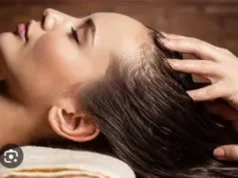Introduction
The use of natural remedies for hair care has been gaining popularity in recent years, with clove water being one such remedy. Clove water is a solution made by boiling cloves in water and is believed to have several benefits for hair, including improving hair growth and preventing hair loss. However, it is important to be aware of the possible side effects of using clove water on hair to avoid any adverse reactions. In this article, we will explore the potential side effects of using clove water for hair and what precautions you can take to minimize them.
Click to subscribe to our Giveaway Channel thank you
What is Clove Water?
Clove water is a solution made by boiling whole cloves in water. Cloves are the dried flower buds of the clove tree and are commonly used as a spice in cooking. The essential oil derived from cloves is also used in various cosmetic and personal care products due to its antimicrobial and antioxidant properties. Clove water is believed to have several benefits for hair, including stimulating hair growth, preventing hair loss, and improving overall scalp health. It is often used as a natural alternative to chemical-based hair care products. However, it is important to use clove water in moderation and be aware of its potential side effects on hair and scalp health.
Also Read: How to prepare Onion Juice for Hair Growth
Benefits of Using Clove Water for Hair
There are several potential benefits of using clove water for hair, including:
- Stimulates Hair Growth: Clove water is believed to increase blood flow to the scalp, which can stimulate hair growth and prevent hair loss.
- Reduces Dandruff: The antimicrobial properties of clove water can help to reduce the growth of dandruff-causing fungi on the scalp.
- Improves Scalp Health: The antioxidants in clove water can help to protect the scalp from damage caused by free radicals, which can improve overall scalp health.
- Conditions Hair: Clove water can help to moisturize and condition the hair, making it soft, shiny, and more manageable.
- Promotes Hair Health: The vitamins and minerals in clove water can help to strengthen the hair and prevent breakage, which can promote overall hair health.
It is important to note that these benefits are not scientifically proven, and more research is needed to determine the effectiveness of clove water for hair care. Additionally, it is important to use clove water in moderation and be aware of its potential side effects on hair and scalp health.
Also Read : How to prepare Clove Water For Hair Growth
Possible Side Effects of Clove Water For Hair Growth
While clove water has several potential benefits for hair, there are also some possible side effects that should be considered. These include:
- Skin Irritation and Allergic Reactions: Clove water can cause skin irritation and allergic reactions in some people, especially those with sensitive skin. Symptoms of an allergic reaction may include itching, redness, and swelling of the scalp.
- Excessive Dryness of Hair and Scalp: Overuse of clove water can lead to excessive dryness of the hair and scalp, which can cause hair to become brittle and prone to breakage.
- Damage to Hair Cuticles and Follicles: The high concentration of clove oil in clove water can cause damage to the hair cuticles and follicles, which can lead to hair loss and breakage.
- Discoloration of Hair: Prolonged use of clove water can cause hair to become discolored, especially in those with light-colored hair.
It is important to use clove water in moderation and perform a patch test before using it on the scalp to avoid any adverse reactions. If any negative reactions occur, discontinue use immediately and seek medical attention if necessary.
Side effects Of Consuming Clove
In addition to its potential side effects on hair and scalp health, using clove or clove water can also have other side effects. These include:
- Stomach Irritation: Clove can cause stomach irritation and may worsen conditions such as gastroesophageal reflux disease (GERD) or peptic ulcers.
- Blood Sugar Changes: Clove may lower blood sugar levels, which can be dangerous for people with diabetes or hypoglycemia. It is important to monitor blood sugar levels closely if using clove as a supplement.
- Allergic Reactions: Some people may experience allergic reactions to clove, which can cause symptoms such as itching, hives, and difficulty breathing.
- Increased Bleeding: Clove can increase the risk of bleeding, especially in people who take blood-thinning medications or have bleeding disorders.
- Skin Sensitivity: Applying clove oil directly to the skin can cause skin sensitivity, redness, and irritation in some people.
It is important to talk to a healthcare provider before using clove or clove water, especially if you have any underlying health conditions or take medications. If any negative reactions occur, discontinue use immediately and seek medical attention if necessary.
Also Read: Side Effects of Onions Juice for Hair Growth
Conclusion and Precautions to Take When Using Clove Water for Hair
In conclusion, clove water has several potential benefits for hair, including stimulating hair growth, reducing dandruff, and improving overall scalp health. However, it is important to use clove water in moderation and be aware of its possible side effects, including skin irritation, excessive dryness of hair and scalp, damage to hair cuticles and follicles, and discoloration of hair.
To minimize the risk of side effects, here are some precautions to take when using clove water for hair:
- Dilute clove water with other ingredients, such as carrier oils, to avoid using it in a concentrated form.
- Perform a patch test before using clove water on the scalp to check for any allergic reactions.
- Use clove water in moderation, and do not apply it to the scalp more than once a week.
- Rinse the hair thoroughly after using clove water to prevent excessive dryness and damage to the hair.
- If any negative reactions occur, discontinue use immediately and seek medical attention if necessary.
By taking these precautions, you can safely incorporate clove water into your hair care routine and potentially experience its benefits for hair and scalp health.
Also Read: Side effects of Vaseline for Hair you should know
FAQs
Here are some frequently asked questions related to the use of clove water for hair:
How do I make clove water for hair?
To make clove water for hair, boil a handful of whole cloves in a pot of water for 10-15 minutes. Allow the mixture to cool, strain out the cloves, and use the resulting solution to rinse the hair after shampooing.
Can I leave clove water in my hair overnight?
It is not recommended to leave clove water in the hair overnight, as it can cause excessive dryness and damage to the hair. It is best to rinse the hair thoroughly after using clove water.
Can I use clove oil instead of clove water for hair?
Clove oil is more concentrated than clove water and can cause more damage to the hair and scalp. It is recommended to dilute clove oil with a carrier oil before using it on the hair and scalp.
How often should I use clove water on my hair?
It is recommended to use clove water on the hair no more than once a week to avoid excessive dryness and damage to the hair.
Can clove water cause hair loss?
Overuse of clove water can cause damage to the hair cuticles and follicles, which can lead to hair loss and breakage. It is important to use clove water in moderation and rinse the hair thoroughly after use to prevent damage.






